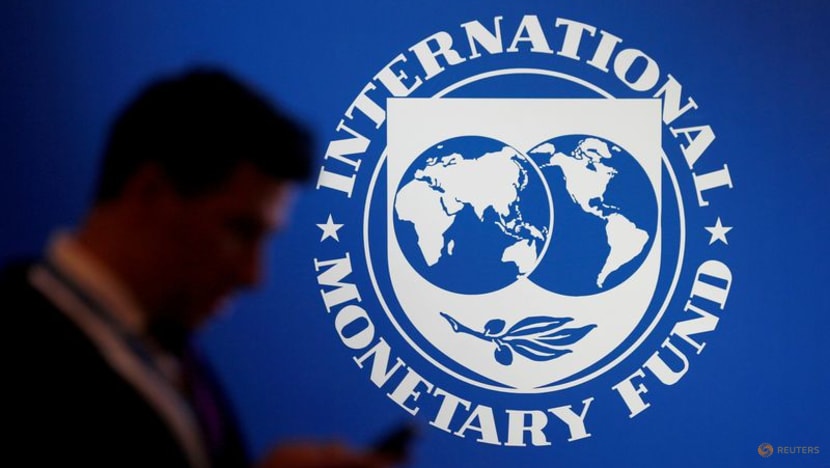Inflation, debt among key challenges for global economy despite raised growth forecast: Senior IMF official
There has been divergent growth between the advanced and developing economies of the world, said the head of the World Economic Studies division in the International Monetary Fund’s Research Department.

The International Monetary Fund (IMF) raised its global growth forecast for 2023 from 2.8 per cent to 3 per cent in its latest update released on Tuesday (Jul 25).
IMF’s world economic outlook for next year remains unchanged, but the organisation warned that it is still too early to celebrate with many challenges clouding the horizon.
Mr Daniel Leigh, head of the World Economic Studies division in the IMF's Research Department, told CNA that there has been “divergent” growth between the advanced and developing economies.
“The advanced economies are the ones leading the slowdown. 93 per cent of advanced countries have slower growth this year than next year,” he said.
“We’ve got growth falling from 2.7 to 1.5 per cent for advanced economies. Some of them, such as Germany, even have negative growth.”
On the contrary, the emerging markets and developing countries have more stable growth forecasted at 4 per cent next year, he noted.
THE CHALLENGE OF INFLATION
Mr Leigh said that global inflation is falling faster than expected, from 8.7 per cent in 2022 to 6.8 per cent this year.
The IMF has revised its inflation projection downward slightly to account for China, which makes up a fifth of the world economy, and whose inflation level is below target, Mr Leigh said.
He added that the decline in inflation will continue next year, but will only get closer to target levels in 2025 or 2026.
Mr Leigh noted that central banks have to tighten monetary policy until inflation is “durably back to target”.
“There's been cases in history where central banks have lifted up the fight too soon, only to see expectations sort of normalise above target levels, and then it's much harder to fight it later on,” he said.
Inflation remains one of the main challenges, said Mr Leigh.
“It could be stickier than expected, and then we'd have to have tightening rates, cooling housing markets and slowing growth, even more than we expect,” he explained.
Another challenge is China, which is rebounding this year from last year's very slow growth. Its real estate sector “poses a risk”, which could have a negative effect on other countries, said Mr Leigh.
DEBT “A SOURCE OF CONCERN”
“Debt is very much a source of concern, especially in lower-income countries. And the lower growth and the higher interest rates mean that several of them – actually more than half – are close to default or already in debt distress,” he said.
Mr Leigh said that in Asia, corporate debt and leverage were already rising before the pandemic.
“But now with the slower growth and the higher rates, that's becoming more and more concentrated in sectors where companies (have) high insolvency risk. And so this is a pocket of vulnerability,” he said.
The banking sector in Asia is well-capitalised, so if they take losses from these companies potentially defaulting, they should be able to absorb them, noted Mr Leigh. However, financial supervisors should still be vigilant, he added.
Another issue is the debt sustainability for countries that have taken on debt.
“They talk about the contribution for the local economy, so the private sector boost that they get could be stronger, and ultimately talk about the credit risk for China from having engaged so much financially,” said Mr Leigh.
In the months and years to come, the Belt and Road Initiative could “benefit from addressing some of those concerns”, he said.
CLIMATE CONCERNS
Mr Leigh said that extreme weather around the world now “gives us a foretaste of the future we might face blighted by climate change”.
While there are immediate impacts such as the closing down of tourist sites, there are also longer term effects on areas such as agriculture, which could especially affect poorer countries that depend on such sectors, he said.

“We've got the public health aspect, people having worse health that affects their productivity. It just creates a big negative mix,” said Mr Leigh.
He stressed the need to mitigate climate emissions through global cooperation, along with adaptation infrastructure to help cope with such shocks, and financial risk management to have insurance options ready.
Citing the IMF’s research on carbon pricing, Mr Leigh said the price of carbon has to be raised “in a predictable (and) very credible way”.
“That way people can plan, and because it's credible, they can really invest in alternative clean energy,” he said.
His team’s research released last October showed that if done correctly, such a measure can even lead to “a little bit of growth”, about 0.2 per cent, with prices being raised “just very modestly”.
















